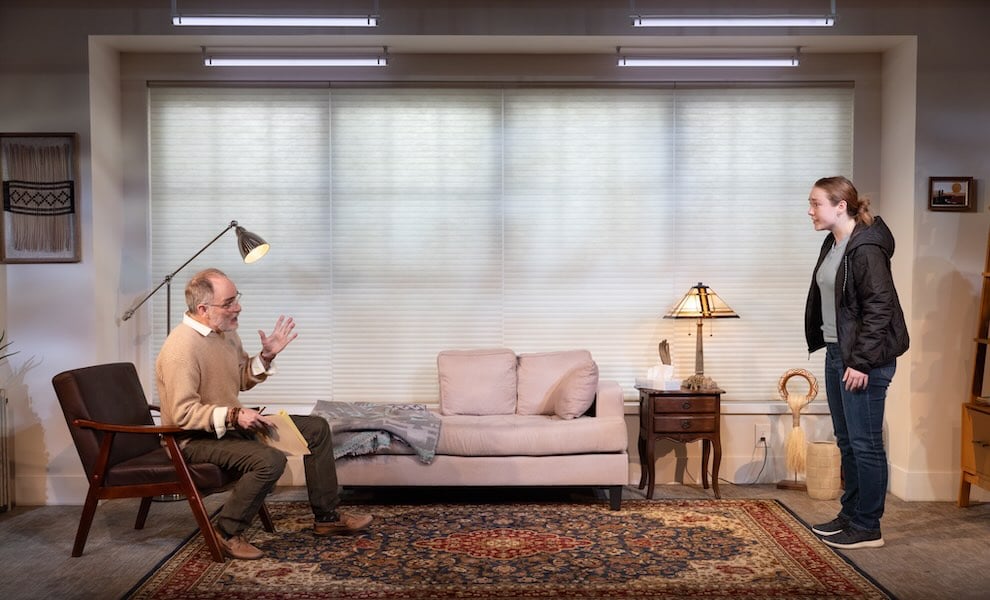To enter a therapy office is to expect to open yourself up to vulnerability in front of a stranger. To enter a theater and find a therapy office onstage is to expect — perhaps with excited nosiness — to witness the vulnerability of another while comfortably behind the fourth wall. But to expect such things from Signature Theatre’s Job is to make a gross misjudgement. In this Northern California therapy office, no effort is made to generate a cozy atmosphere. Instead, therapist, client, and audience are presented with the dark side of humanity and forced to consider questions about the cost of the internet.
Job, written by Max Wolf Friedlich and directed by Matthew Gardiner, is making its DC debut at Signature Theatre after a 14-week Broadway run the previous fall. The show features a cast of two and centers around their conversation in a combative therapy session.

Jordan Slattery plays Jane, a “user care” worker whose job scrubbing graphic content from the internet drives her to a viral meltdown at work. Opposite her — often literally as the two converse from far ends of the stage — is Eric Hissom as Loyd, Jane’s work-mandated therapist tasked with determining whether she is fit to return to the office.
The play interrogates the price of the internet through the experience of one of its greatest champions. Jane, whose speech is peppered with Gen Z slang, dismissively denounces “boomers” who chastise youth for screen addictions. She defends the time spent on her phone as vehemently as she defends the job that makes her watch videos of gore and torture.
Slattery plays Jane with a frazzled intensity. She recalls the content she’s seen with disgust in her voice and a detached look on a face that can no longer cry. Slattery is most spirited when expressing Jane’s cult-like dedication to her job. Through this enthusiasm, contrasted with the devastating reality of what her work truly entails, Job presents uncomfortable questions about the tech industry and the human price of the internet.
Hissom’s performance — while initially providing a calming contrast to Slattery — shifts toward hinting at a darker tension as the play progresses. In the beginning, he speaks with a confidence laced with caution. He is not only a therapist but also a hostage negotiating his way out of a cell and a samaritan talking a woman off a bridge. Hissom’s strongest moments come when Loyd’s true feelings burst out in an explosion of anger and frustration, revealing a rage hiding beneath the therapist’s relaxed brown knit sweater and unbuttoned cuffs.
 There is a painful irony in Jane’s commitment to her job. If her searing descriptions of the videos — and Slattery’s intense, red-rimmed eyes — could possibly not be enough to shock the audience, the flashbacks she suffers throughout the play also bring in startling moments that force the audience to confront her trauma. And yet Jane fiercely defends her job, craving the power that protecting others from viewing the horrors online gives her.
There is a painful irony in Jane’s commitment to her job. If her searing descriptions of the videos — and Slattery’s intense, red-rimmed eyes — could possibly not be enough to shock the audience, the flashbacks she suffers throughout the play also bring in startling moments that force the audience to confront her trauma. And yet Jane fiercely defends her job, craving the power that protecting others from viewing the horrors online gives her.
Job never leaves the confines of Loyd’s office, but in many ways, it ventures far beyond the bounds of that Northern California therapy office. As Jane recounts the videos of sexual and violent content she watched in her role in content moderation — or user care, as her company euphemistically calls it — she reveals the dark side of humanity that her job tasks her with scrubbing from the internet.
Representing a virtual space onstage is difficult, but Job’s creative team makes inventive use of sound and light design to convey the online realm to which Jane craves return. When moments during the therapy session trigger memories of graphic content Jane witnessed online, a static buzz fills the air, overlaid with the detached click, click, click of a computer mouse. The lights onstage fluctuate brighter and darker — sometimes cutting out entirely — and the screen of a desktop Mac sitting in one corner glows white and draws Jane’s horrified hollow gaze. It is through these scenic modifications that the audience is immersed in Jane’s traumatic flashbacks.
This is where the work of Lighting Designer Colin K. Bills and Sound Designer Kenny Neal shines, linking the comfortable-enough therapy office to the dark world Jane has grown obsessed with. These design choices, set within a plot whose twists and surprises Friedlich gradually reveals, give the production an uneasy edge. Combined with a tension between Jane and Loyd that mounts from the start and never subsides throughout their 90-minute session, the play presents a tense thriller that ruthlessly reminds its audience of the darkness lurking behind every screen.
The thinking behind the show’s title leaves little room for doubt: Jane’s obsession with her job and the cost it wrought on her mental health are the catalysts that brought her to therapy. But it also brings to mind another interpretation that hints at the tragedy behind Jane’s situation: despite being presented with as much suffering as the Biblical Job, she never loses faith in her god — the internet.
Running Time: Approximately 90 minutes with no intermission.
Job plays through March 16, 2025, in the ARK Theatre at Signature Theatre, 4200 Campbell Avenue, Arlington, VA. For tickets ($40–$90), call (703) 820-9771 or purchase online. Information about ticket discounts is available here.
The program for Job is online here.
Closed captions are available via the GalaPro app.
COVID Safety: Masks are optional in the lobby and other public areas of the building except that face masks are required inside the performance spaces on February 11 at 7:30 PM and March 2 at 2 PM. Signature’s COVID Safety Measures can be found here.
Job
By Max Wolf Friedlich
CAST
Loyd: Eric Hissom
Jane: Jordan Slattery
ARTISTIC AND CREATIVE TEAM
Directed by Matthew Gardiner
Scenic Design by Luciana Stecconi
Costume Design by Alexa Cassandra Duimstra
Lighting Design by Colin K. Bills
Sound Design by Kenny Neal
Casting by Jorge Acevedo
Stage Manager: Lauren Pekel
SEE ALSO:
Signature Theatre announces cast and creative team for ‘Job’ (news story, January 8, 2025)



